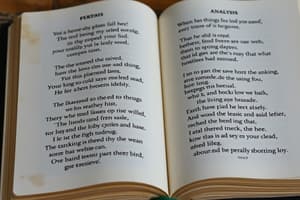Podcast
Questions and Answers
What is defined as the use of two opposing ideas at once, often preceding a noun?
What is defined as the use of two opposing ideas at once, often preceding a noun?
- Imagery
- Oxymoron (correct)
- Allusion
- Cacophony
Which literary device involves a series of lines or sentences that begin with the same phrase?
Which literary device involves a series of lines or sentences that begin with the same phrase?
- Repetition
- Rhyme
- Enjambment
- Anaphora (correct)
What type of poem is characterized by a specific rhyme scheme and tells a silly story in five lines?
What type of poem is characterized by a specific rhyme scheme and tells a silly story in five lines?
- Couplet
- Narrative
- Haiku
- Limerick (correct)
What literary device is highlighted when a poem has no regular rhythm, meter, rhyme, or structure?
What literary device is highlighted when a poem has no regular rhythm, meter, rhyme, or structure?
Which of the following refers to a technique that helps readers visualize by appealing to the five senses?
Which of the following refers to a technique that helps readers visualize by appealing to the five senses?
Flashcards
Oxymoron
Oxymoron
Using two opposite ideas together.
Couplet
Couplet
Two rhyming lines of poetry.
Anaphora
Anaphora
Repeating phrases at the beginning of sentences.
Blank Verse
Blank Verse
Signup and view all the flashcards
Haiku
Haiku
Signup and view all the flashcards
Study Notes
Literary Devices
- Oxymoron: The use of two opposing ideas at once, often an adjective or verb used before a noun.
- Cacophony: Use of unpleasant, harsh sounds (usually consonants) in words to create a specific effect.
- Couplet: Two lines/verses of poetry with the same rhyme and number of syllables.
- Anaphora: A series of phrases, clauses, or sentences beginning with the same words.
- Blank/Free Verse: Poetry without regular rhythm, meter, rhyme, or structure.
- Haiku: A three-line poem originating in Japan, often about nature.
- Limerick: A five-line poem with a specific rhyme scheme and often humorous or silly content.
- Narrative: Poem that tells a story, with characters, setting, and plot.
- Enjambment: Continuation of a sentence beyond a line break without punctuation.
- Rhyme: Words with the same or similar ending sounds.
- Pun: A play on words, using different meanings of a word or similar-sounding words for a humorous effect.
- Imagery: The author's use of language to evoke the senses, allowing the reader to visualize.
- Allusion: A reference to something, often well-known, to add meaning.
- Theme: The main idea or message conveyed by the author in a piece of literature.
- Repetition: Repeated words, phrases, syllables, or sounds to emphasize a point, image, or feeling.
Studying That Suits You
Use AI to generate personalized quizzes and flashcards to suit your learning preferences.




